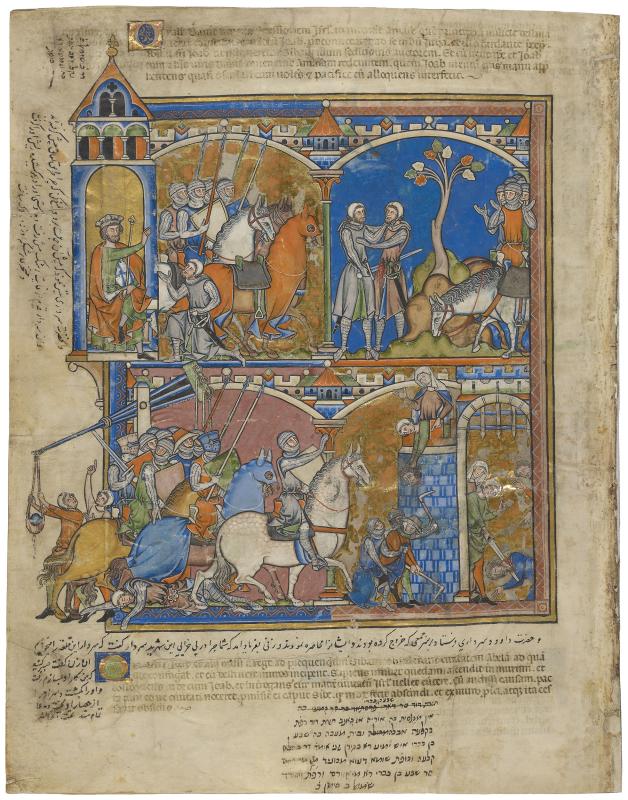
David Orders the Destruction of Sheba, Joab Slays Amasa, Joab Brokers Peace
Old Testament Miniatures with Latin, Persian, and Judeo-Persian inscriptions
Purchased by J.P. Morgan (1867–1943) in 1916
Folio 43v (Latin)
Upper left: How the firstborn killed, all the king’s sons flee. (2 Samuel 13: 29)
Upper right: How a rumor reached the king that Absalom had killed all of his sons. Upon hearing this, he and those who were with him tore their clothes and grieved inconsolably. (2 Samuel 13: 30, 31)
Lower half: How, having slain his brother, Absalom fled to Talmai, the king of Geshur and spent three years there. (2 Samuel 13: 37–38)
Folio 43v (Persian)
Upper left margin: Since such a deed had issued from the son of David, his brothers gathered together; they mounted horses and set out to flee.
Upper right margin: After that, news reached David that the brother had killed those sons. He was exceedingly saddened by this word.
Lower left margin: This son who killed the brother was called Absalan [Absalom]. After killing the brother, he took refuge with the king of the idolaters and remained there for three years.
Folio 43v (Judeo-Persian)
David Orders the Destruction of Sheba
David chooses Amasa to lead an assault against Sheba, but loses patience when his new commander is late. Abishai, Joab's brother, is summoned and instructed to pursue the enemy. (2 Kings 20:4–10)
Joab Slays Amasa
At Gibeon, Joab encounters Amasa, the new commander of David's army, and, thus, Joab's rival. Joab takes Amasa's chin in his hand as if to embrace and kiss him, but instead thrusts his sword through his rival's belly. (2 Kings 20:9–10)
Joab Brokers Peace
Joab pursues Sheba to the city of Abel, where the traitor and his forces have taken refuge. In the foreground lies the slain Amasa, his bowels spilling forth. As the army prepares to loose a trebuchet, Joab is hailed by an elderly woman of the city. She appeals to the commander's mercy and strikes a bargain. She will produce the head of the traitor Sheba if Joab will spare the city. Moments later, the traitor is decapitated and his head displayed to the soldiers. The siege and the rebellion are at an end. (2 Kings 20:15–22)
